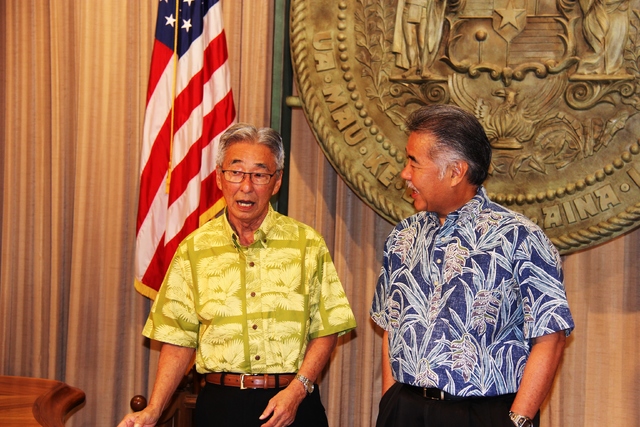HILO — Getting a liquor license in Hawaii just became less cumbersome, under a bill signed into law Friday by Gov. David Ige.
Act 012, which takes effect immediately, was signed during the first formal bill-signing of the year.
“I’m happy to be able to sign this to really make it a lot simpler for businesses to do business in the state of Hawaii,” Ige said.
The new law allows publicly traded companies to submit information only on those individuals actively involved in the purchase and sale of liquor rather than the entire list of officers. It also allows companies to use tax certificates to prove the company is up-to-date on taxes when applying for or renewing liquor licenses.
“I think this is exactly what it is that we want to be able to do,” Ige said. “So many things that the state requires is really about making work and making it hard for business when there is no value in the process other than to make work.”
It’s a simple technical change, but it’s important to some of his constituents, said Rep. Clift Tsuji, the Hilo Democrat who sponsored the measure. Co-sponsors included Rep. Cindy Evans, a Kona Democrat.
“This is exciting,” Tsuji said Thursday. “I’ve introduced a bill that’s maybe very regulatory, but it’s very meaningful. It’s one way we as a Legislature can support our constituents.”
Kona Brewing Co. was among the handful of businesses that sent in testimony about the bill.
“We believe that this bill is an important step toward ensuring adequate and efficient administration of the application process,” said Kona Brewing Co. President Andy Thomas in testimony.
He could not be reached Thursday or Friday for further comment.
Honolulu attorney Newton Chu was a driving force behind the legislation.
“I represent numerous publicly and privately owned companies in connection with liquor issues in all counties and believe this bill would benefit the application process in each county,” Chu said. “This bill would create a more business friendly environment, without jeopardizing the original purpose of ensuring that ex-felons are not involved in the sale of liquor in Hawaii, since it would only apply to publicly owned companies, who are already subject to strict regulation and oversight by the Securities and Exchange Commission and other government agencies.”
Hawaii County Liquor Control Director Gerald Takase was off-island and couldn’t be reached for comment Friday. But Liquor Control offices from other counties filed testimony supporting the measure.
“This streamlines the law and clarifies the law without taking away from the oversight functions of Liquor Control,” Tsuji said.



